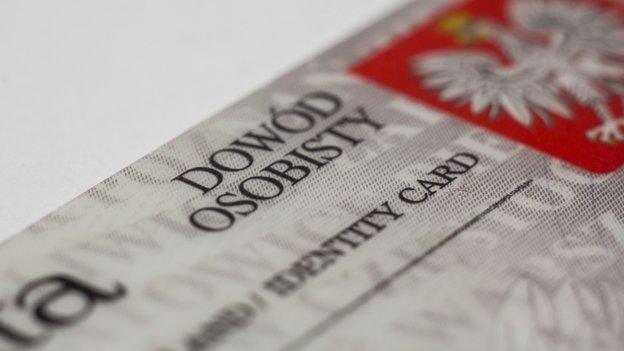'No difference' in immigration attitudes, politicians claim
- Published
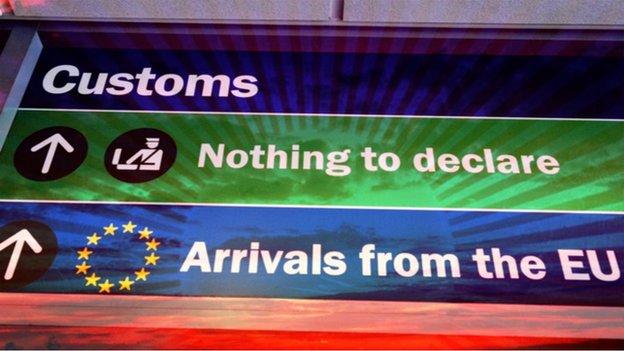
Almost two-thirds of Scots think immigration should be reduced, a poll commissioned by the BBC has suggested.
It suggests that Scots are almost as negative about immigration as the population in the rest of Britain.
The poll found that 49% wanted to see less immigration, exactly the same proportion as across Britain, and 15% said it should be stopped altogether.
This is in contrast to politicians at Holyrood, who tend to agree that Scotland needs more skilled migrants.
However, the Conservatives and UKIP argued that attitudes were similar on both sides of the border.
In the YouGov/BBC poll just 5% said immigration should be increased - only slightly more than in England.
Some 27% of Scots said immigration was good for the country compared to 22% across Britain.
The poll suggested that 64% of people in Scotland wanted immigration reduced or stopped completely. The figure for Britain as a whole was 70%.
It found that women in Scotland were more likely to want immigration cut (69%) than men (60%).
Older people were much more likely to be against immigration, with 76% of over 60s in favour of a reduction as opposed to 43% of 18 to 24 year olds.


The poll, conducted online by YouGov between 4 and 6 March, asked 1,100 Scottish adults a range of questions on the subject of immigration.
The questions matched those asked in a Britain-wide survey conducted in February 2014.
In Scotland, those with a higher income were more likely to welcome immigration, and men were more positive than women.
Demographics suggest Scotland's population is ageing and, despite immigration-driven population growth over the past decade, the political consensus in Holyrood is in favour of more migrants of working age coming in to take on jobs and set up businesses which can grow the economy.
Despite the rise over the past decade Scotland still has a small immigrant population relative to England, especially London.


Average net migration to Scotland - the difference between people moving here and people leaving - is approximately 10,000 per year. For the UK as a whole it is about 300,000.
In 2010 Prime Minister David Cameron pledged to reduce net immigration in the UK to bring it under 100,000.
But last year, former First Minister Alex Salmond promised to increase net migration in Scotland.
Questions remain about whether the people of Scotland share the views of their elected representatives.

Welcome to Scotland?

Responding to the poll's findings, Dr Marina Shapira of the school of applied sciences at Stirling University said negative attitudes towards immigration were not generally expressed as strongly in Scotland as they are elsewhere in Britain.
She added: "But we shouldn't underestimate the power of politics in the UK level and the power of the media at the UK level and the things that people hear every day.
"They are exposed not just to Scottish politicians, they are exposed to politicians on the level of the UK. They have common economic space and common political space and for that reason people probably people don't see themselves that much isolated from the factors that are being told to the rest of the population in Britain.
"We shouldn't overestimate the huge power of the voice coming from the south in Britain and people also listening to that voice too."

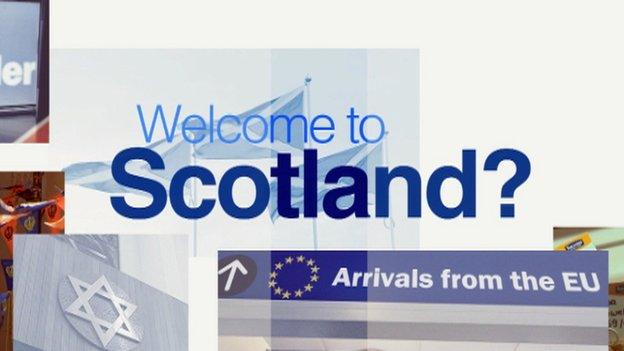
Analysis
By BBC Scotland's Douglas Fraser
Should we be surprised that nearly two-thirds of Scottish voters want to see immigration reduced?
The evidence is consistent that Scottish public opinion on immigration is less negative or hostile than in Britain as a whole. But not by much.
Only rarely do the comparable Britain-wide survey results reach the opposite majority conclusion to those in Scotland.

Humza Yousaf, the Scottish government's minister for international development and external affairs, said Scotland needed skilled migrants because of the ageing population and that politicians needed to address public concerns about immigration.
The SNP MSP said politicians needed to help the debate rather than engaging in "kneejerk, populist" reactions. Mr Yousaf highlighted research on the economic benefits of migrants.
"When you look at immigration you have to be willing to break it down," he said.
"I think if you ask most Scottish people and most people around the UK 'do they want to see high-skilled migration to fill gaps?' then the majority do not want to see that reduced.
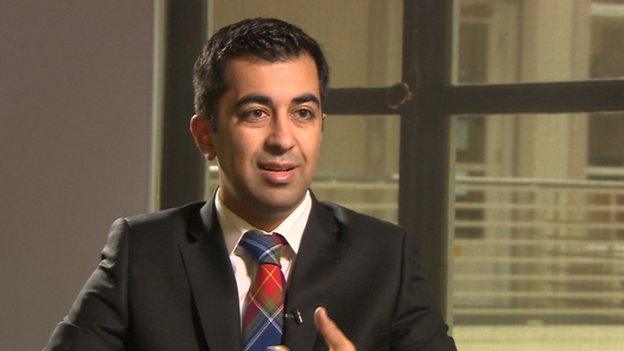
MSP Humza Yousaf said Scotland needed skilled migrants
"And studies have shown that, and so the Scottish government and politicians across the UK have a job to shape opinion on immigration and tone down the rhetoric, not inflame the rhetoric."
'Front line'
Scottish Conservative MSP Alex Johnstone said: "Survey after survey shows there are no real differences between Scotland and England when it comes to attitudes on immigration.
"Despite this, the SNP spent the entire referendum campaign trying to fool people into thinking the opposite.
"The Scottish government has missed a great opportunity amid the UK's economic recovery to get unemployed people into areas where workers are needed.
"That's why we are left in a ridiculous position of having areas of high unemployment not all that far from areas of labour shortage."
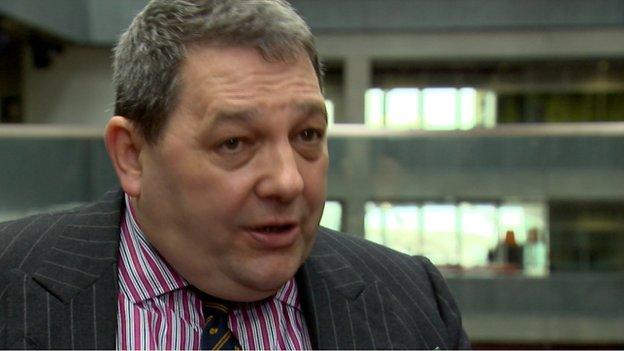
UKIP's David Coburn said Scotland was not on the frontline for immigration
David Coburn, the head of UKIP in Scotland and an MEP, accused politicians north of the border of failing to address people's concerns about immigration.
He said attitudes in Scotland were only slightly different because of geography.
"England is on the front line, the south coast is on the front line, the east coast is on the frontline," he said.
"Scotland is further away. Therefore it has not impacted quite as much yet, but the attitudes are just the same."
Mr Coburn added: "There is no real difference in attitudes between the Scots and English. The guy in the pebble-dash house in Birmingham has the same problems as the guy in the pebble-dash house in Glasgow.
"They have got the same problem with rates, with paying their bills, with the NHS."
The Big Immigration debate is on BBC Two Scotland at 22:30 on Tuesday 10 March
- Published11 March 2015
- Published9 March 2015
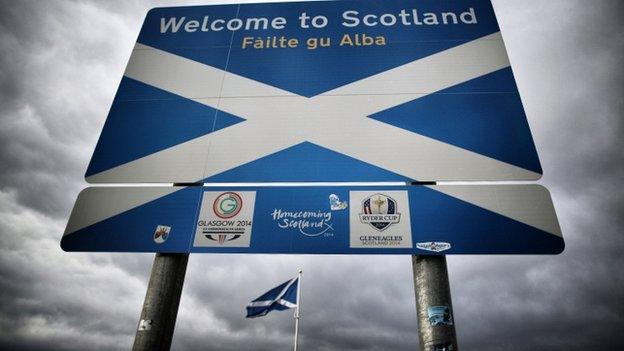
- Published9 March 2015
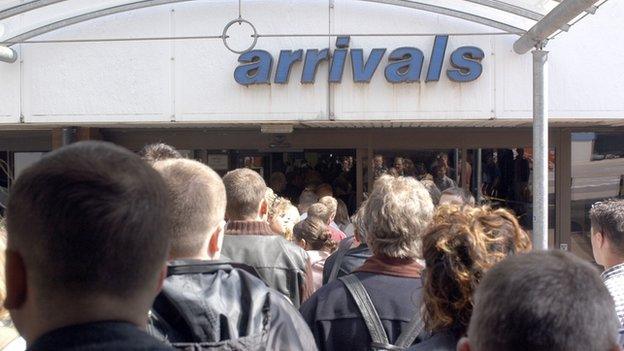
- Published9 March 2015
